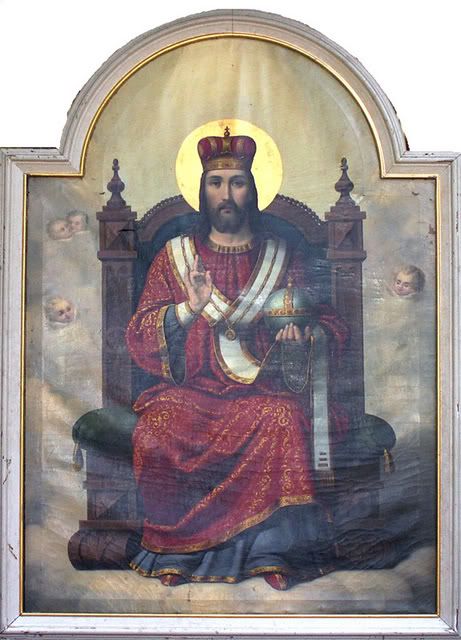The Restoration of the Reign of Christ the King

[Image of Christ the King, taken from Pius XI: The Kingship of Christ]
[The following is excerpted from "The Reign of Christ the King in Both Public and Private Life," by Michael Davies; published by Tan Books. According to the publisher, it was "slightly adapted [from] a talk given by Davies at the VNI Conference in the Chicago area in November of 1991. VNI - Voice Network International - is an organization based in the Chicago area and run by Catholic laymen to promote solid Catholic restoration in the Church."]
"We must make the social reign of Christ the King possible today. If we do not do all that is in our power to restore the Social Kingship of Our Lord, we are not worthy of our Baptism, we are not worthy of our Confirmation, we are not worthy of the glorious name of Catholic. There is only one solution to the problems of mankind, and that is to establish the peace of Christ in the Kingdom of Christ - Pax Christi in regno Christi. There is no other solution to what Professor [Dietrich] von Hildebrand rightly termed the dehumanization of mankind."
"Hilaire Belloc explained that the two alternatives for our civilization are Catholicism and chaos. Anything less than Catholicism - even if it calls itself "Christianity" - will not stand up in the long run against the encroaching barbarism. So it is we Catholics who actually hold the key both to the social reign of Christ and to the saving of our civilization. We must therefore all work toward the day when the governments of our nations (as well as all individual men) publicly recognize Christ, His Catholic Church, and His holy law - and regulate themselves accordingly."
"Do not say that this cannot be done. It has been done with the fight for the Tridentine Mass, which is now being celebrated throughout the world to an extent that few of us would have deemed possible a few years ago. It has been done with the pro-life movement...."
"We can fight for the Social Kingship of Our Lord without the need of approval or leadership from our bishops. We can and must mobilize all citizens of good will, whether they are Catholic or not. There were Protestants and even Jews who fought the "Gay Rights Bill" in Connecticut, and they were undermined by our bishop."
"If anyone reading this honestly believes that society cannot be changed, I can only reply, 'Tell that to to the homosexuals, tell that to the abortionists.' They have changed society, they have corrupted it, dehumanized it, but they knew what they wanted and they were prepared to fight for it, and they are still prepared to fight for it. Shall the children of the light show less zeal than the children of darkness?"
"...This is a providential moment to begin this crusade. There is a definite revulsion among basically decent people at what they see happening to society, and, as Catholics, we can mobilize them to campaign against so-called "rights," which...are not rights at all, and cannot be rights, because they are contrary to the law of Christ the King."
"Let us begin the campaign to restore our King to His rightful throne by working to overthrow the diabolic trinity of abortion, pro-homosexual legislation, and pornography. These are evils that cry to Heaven for vengeance. They...can be made illegal once again."
"'Impossible,' you may say. Why impossible? Impossible because we, as the children of light, are not as prepared to commit ourselves to the fight for what is good as the children of darkness are to commit themselves to the fight for what is evil?"
"Because all men are subject to the law of Christ the King, particularly in what concerns the natural law, which is engraved in the heart of every human being, we must, as I have just suggested, do all in our power to enlist the support of both Catholic and non-Catholic people in the fight for those basic decencies which are absolutely essential to the social reign of Christ and without which society will disintegrate. As Professor von Hildebrand has warned us, we shall even become dehumanized...."
"...Von Hildebrand taught correctly that in a state consisting principally of non-Catholics it is the vocation of Catholics to act as a leaven, but how can they do this when their commitment to the Kingdom of Christ the King is, in most cases, so manifestly inferior to that of so many devout Protestants?"
"This means that, in re-establishing the reign of Christ the King, our first task must be to re-evangelize the Catholic community. We must fight for orthodox religious instruction in our schools, and above all, for a liturgy in which Our Lord is recognized clearly as our King, and this must be [for Latin rite Catholics] the traditional Mass...the Tridentine Mass. The liturgy of the traditional Mass is focused upon God, that in the New Mass is focused upon the community. The reign of Christ the King cannot be established until He becomes once more the center of our lives."
"...I would like to conclude on a note of optimism. Our Lady has promised [at Fatima] that, in the end, her Immaculate Heart will triumph. She has promised this, and she will fulfill what she has promised. This means that, without a doubt, her Son will reign - He must reign!"




